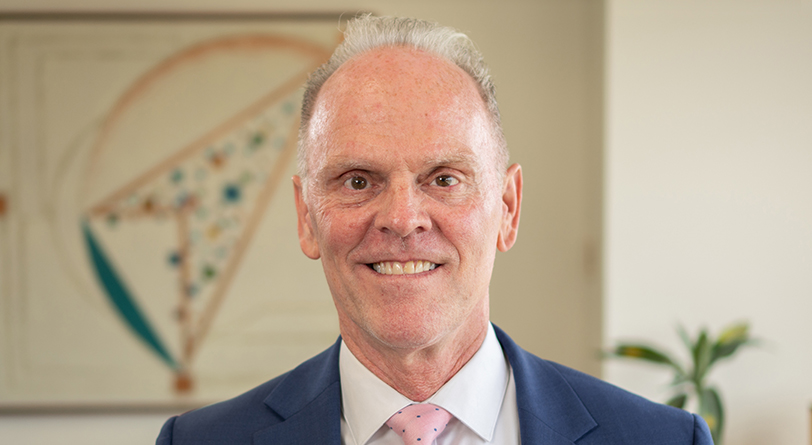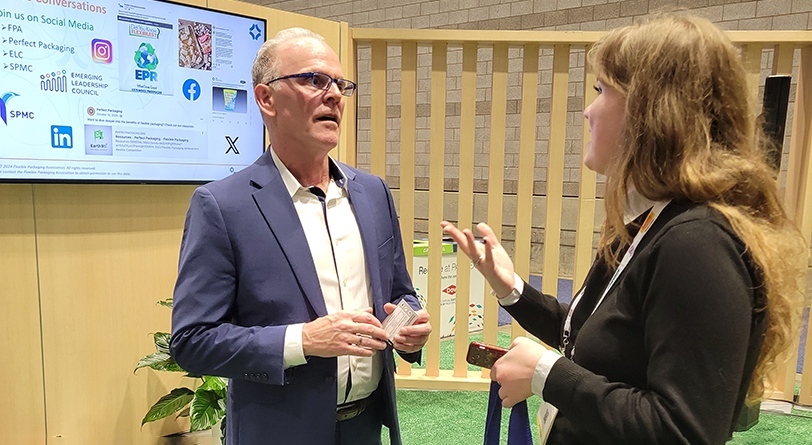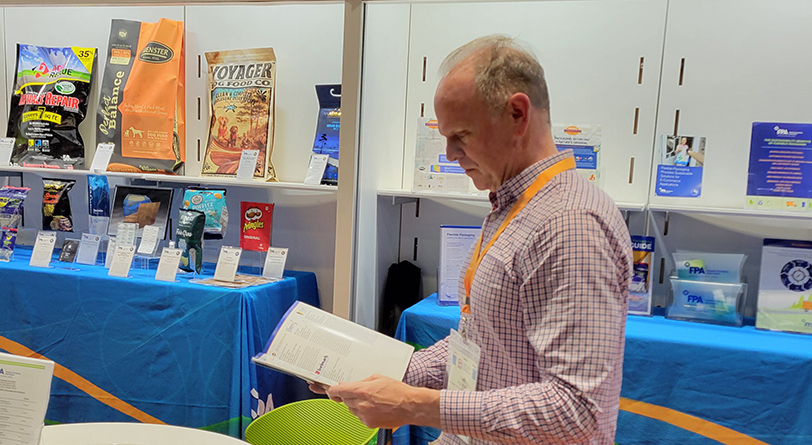A Conversation With Dan Felton, FPA’s New Leader
Felton Comes From AMERIPEN, Where Packaging EPR Is a Top Concern

As Dan Felton prepared to start his new position as president and CEO of the Flexible Packaging Association (FPA) this fall, he reflected on how some of the issues facing FPA were the same as at AMERIPEN—the American Institute for Packaging and the Environment—where he had spent nearly five years leading that association.
Extended producer responsibility (EPR) for packaging is the best example, especially because AMERIPEN was founded in 2010 in part to monitor EPR as it was first gaining momentum in the United States. The organization wanted to stay on top of any proposals that would make producers of packaging responsible for managing and paying for its disposal. Other shared issues include legislation and regulations around labeling, recycled content, and additives such as per- and polyfluoroalkyl substances (PFAS), he says. EPR, however, has been consuming much of the attention of both organizations now that five states have adopted laws and are in various stages of implementing them.
Path to Advocacy Work
Felton, who officially began at FPA on November 1, 2024, was raised in a family of nine boys around the Twin Cities of Minneapolis/Saint Paul, Minnesota. He moved to the Washington, D.C., area and has been living in Prince George’s County in Maryland, nearly 40 miles from FPA headquarters in Annapolis.
Felton attended Gustavus Adolphus College in Minnesota and earned a B.S. degree in biology, with a minor in music and theater. Those disciplines prepared him well for a career in public policy: The science background helps with understanding the complexities of the issues, and the theater background puts him at ease when presenting ideas and giving presentations.
“When you’re an actor, you have to think on your feet, and you have to expect the unexpected when you are in a live performance,” he says. “And you have to think on your feet when you are testifying at a hearing or speaking at conferences. I’m just comfortable in front of people.”
Since 2002, Felton has developed a deep background working in trade associations and coalitions, with a focus on government affairs and public policy.
“I really cut my teeth in that area within the bottled water industry. I was with the International Bottled Water Association for almost seven years doing federal and state public policy work,” he says.
To better understand the corporate world, he worked in private industry, including nearly five years at Phillips, a healthcare technology company, where he focused on government affairs.
“I felt that was important for my trade association background to understand the mechanics of the corporate world,” he says.
Felton resumed the trade association track after AMERIPEN expanded its capabilities and created a new leadership position in late 2019. AMERIPEN had been operating under an executive committee and board that was running the organization before moving back to a structure run by an executive director, Felton points out.
“From the advocacy side, 2025 is going to be nuts again for the packaging industry, including the flexible packaging industry. Buckle up everybody because it’s going to be another busy year. The issues are not going away.”
Dan Felton, FPA president and CEO
AMERIPEN and EPR
Incorporated in 2011, AMERIPEN represents the entire packaging value chain and was formed in part as stakeholders were starting to examine packaging EPR in the U.S. Felton credits AMERIPEN’s founders with having the foresight to know that EPR would be important in the future. When EPR laws started being passed in recent years, the groundwork had been laid to prepare and respond. California, Colorado, Oregon, Maine, and Minnesota have adopted EPR laws—and more are expected to follow in 2025.
One of Felton’s goals at AMERIPEN was to be proactive on public policy rather than play “whack a mole and run around beating down bad ideas,” he says. That approach has worked well as other issues have developed such as moves by states to address labeling laws and to regulate PFAS.
During his tenure, AMERIPEN tripled in size and revenue. Most importantly, the organization was set up more than a decade ago “to be the right organization at the right time in the right place” to help companies navigate their place in the packaging value chain for laws and regulations, including EPR, he adds. “That has helped AMERIPEN to be one of the subject matter experts in that space, which has helped with the growth.”
Although EPR conversations have started with federal officials, he doesn’t think measures will roll out on a national level anytime soon. Policymakers will continue to take the lead on a state-by-state basis. That creates logistical challenges for AMERIPEN and FPA members, which is where being proactive is critical, he says.
“When you think of five states passing five laws in two-and-a-half years, it is quite remarkable,” Felton says. “And the industry is still trying to get its head around it as well as policymakers. But the industry is still trying to figure out what they want for EPR, and I do not think anyone necessarily wants a federal program that puts EPR in all 50 states.”
For example, end markets for recycled products are important, so systems need to be geared on a regional level, not nationally, although federal guidance and standards would be helpful, policy observers have said.
“When the conversation starts to get more mature, then there is definitely a role for the federal government to play,” he says. “It might not be having the jurisdiction over programs in all 50 states, and quite frankly, federal law would not really help given the way it is currently structured.”

In the meantime, states such as California have continued to be aggressive with plastic waste. In the fall, California’s attorney general sued ExxonMobil claiming that the company had not been truthful about its recycling claims over the years, particularly when it came to endorsing advanced recycling technologies.
At the time, ExxonMobil pushed back.
“For decades, California officials have known their recycling system isn’t effective. They failed to act, and now they seek to blame others,” Lauren Knight, an ExxonMobil spokesperson, said in the statement. “Instead of suing us, they could have worked with us to fix the problem and keep plastic out of landfills.
“The first step would be to acknowledge what their counterparts across the U.S. know: advanced recycling works,” she continued. “To date, we’ve processed more than 60 million pounds of plastic waste into usable raw materials, keeping it out of landfills. We’re bringing real solutions—recycling plastic waste that couldn’t be recycled by traditional methods.”
Felton notes that one issue with advanced recycling is that some policymakers do not consider it to be recycling.
“I don’t think the conversation is over about advanced recycling,” he says. “We’re all continuing to look at it as we try to define what recycling is and what it can include.”
Plastic packaging and flexible packaging will always face opposition from policymakers who are antiplastic in any of its forms, he points out. As an example, he cites the 2023 New York lawsuit against PepsiCo that accused the company of polluting through its single-use plastic products.
“When you look at the lawsuit against PepsiCo in New York state, it’s more about hobbling the existence of a packaging material, and in this instance, it is plastics,” he adds.
“California’s lawsuit is, in part, an attack on plastics. And advanced recycling enables more plastics to be recycled. Some do not want plastics in the first place, so they are going to go after advanced recycling.
“On a higher level, I don’t think we are done seeing lawsuits,” he adds.
Felton says some EPR proposals intentionally don’t discuss advanced recycling so that the issue can be addressed later or not at all. Other proposals such as ones in New York would ban advanced recycling.
“As we are trying to figure out how to define recycling, advanced recycling is playing into it,” Felton says.
Similar discussions have been swirling around mandates for recycled content in products.
“When you look at New Jersey as an example, they unequivocally have now said you cannot count advanced recycling to meet recycled-content mandates,” he says.
FPA and 2025
As he prepared to start his new role at FPA, Felton said he intended to spend the first few months getting to know the members, staff, and organization more deeply. He has some ideas on what he would like to do later in 2025 but wants to hold off on specifics until he has had time to learn more about the operations at FPA, which will mark its 75th anniversary this year.

“FPA must and will continue to advocate strongly on behalf of the flexible packaging industry,” he says. “We can be doing more. From the flexible packaging perspective, it is squarely in the sights of all these things we and policymakers are talking about. So, we are going to explore opportunities to be even more proactive and more aggressive in looking for pathways forward for the collection of flexible packaging and end markets. And we have to be out in front of the policymakers and the administrators.”
He also intends to continue running the association like a business, where the members are the customers. That means communicating with them often and offering resources such as informational webinars, market data and reports, and networking opportunities so they can stay on top of evolving issues. FPA’s Emerging Leadership Council has been doing an excellent job of creating educational materials, he points out. All of those efforts and more will help continue to spread the word about why flexible packaging is important.
“From the advocacy side, 2025 is going to be nuts again for the packaging industry, including the flexible packaging industry,” he says. “Buckle up everybody because it’s going to be another busy year. The issues are not going away.”
ADDITIONAL INSIGHTS
For more from the interview with Felton, see a question-and-answer article at flexpackvoice.com.
Thomas A. Barstow is senior editor at FlexPack VOICE®.


